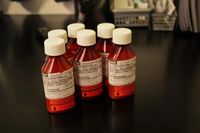The prescription of methadone and other opioid agonist therapies (OAT) to people who use opiates/opioids is central to harm reduction strategies around the world. OAT is one of many tools that, if adequately dosed when prescribed, can provide stability and a better quality of life for people who depend on opioids daily. However, during holidays, which should in fact be an opportunity to relax and spend time with loved ones, OAT clients often struggle with or dread the realities of wondering:“How am I going to get my dose without my whole family knowing?”
“How am I going to get my dose without my whole family knowing?”
Under the current OAT system in Ontario, if someone has either missed multiple doses in a row, hasn’t provided a urine test positive for drugs (even those which are not opioids/opiates), and/or, has not had enough time on the program to earn take-home methadone doses (also known as “carries”), it is at the discretion of the healthcare prescriber to decide whether to prescribe a “carry” or not. If the prescriber is feeling generous, and the holiday is only one day, then they may prescribe a single carry. Even this singular carry is not a certainty. A more likely and common outcome, especially for holidays or trips that are multi-day, is that the person will have to find a pharmacy that is open to administer their methadone dose. This is not easy, as there are few, if any, complete online directories for pharmacies, and very few pharmacies that are open during the holidays that will provide a dose to an out-of-town client of these life saving medications. When will they allow people on OAT to get their medication like everyone else and stop regulating it so damn much?
“When will they allow people on OAT to get their medication like everyone else and stop regulating it so damn much?”
When someone is visiting a place that they are not familiar with or where language is a barrier, this can be a serious obstacle to getting their daily dose. In many instances, doctors do not make this process easier and have little empathy or understanding for the person’s situation. If a person is in a rural community or travelling out-of-town, the onus is on them to find a pharmacy that will dispense the medication. The inability to locate a pharmacy willing to provide any type of OAT medication results in an unpleasant vacation that cannot be described as a holiday at all, but rather an unfortunate and painful experience. In order to stave off terribly unpleasant withdrawals, which can hardly be understood by those who have not experienced them, and make the most of their “holiday” with dignity and comfort in mind and body, people are often forced to find a substitute for their OAT medication on the street in whatever form is available to them. This can very easily end in an overdose or overdose death due to an unstable and toxic drug supply, all during what is supposed to be the happiest time of year.
The unfortunate reality for people on OAT is that taking part in any of these strict “helpful” therapies can result in less-than-ideal outcomes. Colloquially, being on methadone is described as wearing a set of “liquid handcuffs” where current guidelines in many regions limit the person’s ability to take vacations, spend time with family, further oneself by attending out-of-town conferences, and quite simply make the most of life. From where I sit, I have seen and heard of pharmacies and doctors that make peoples’ lives easier by being more lenient with carries and other protocols.
But many more people have experiences with doctors who have little to no regard for the long-term consequences, with their focus instead being on the lucrative, money making side of being a prescriber and/or running an OAT clinic. This might not be the case everywhere for all people who are opioid dependent during the holidays, but I am suspicious that it may very well be this bad or even worse for most.



